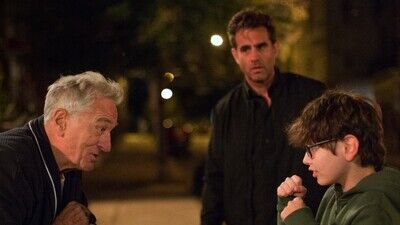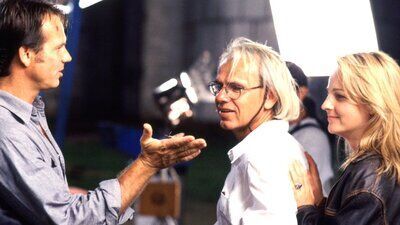Last month, I was a juror in the Narrative Feature category at the Florida Film Festival; one of the films, “Hellbent on Boogie,” directed by Vito Trupiano, was about an autistic teenager (Alyx Ruibal) being homeschooled by her mother and kept in isolation from her peers. The portrayal of neurodivergence has an authenticity one doesn’t see often in films like this, and Ruibal, who is on the spectrum herself, is amazing and natural in the role (extraordinary, since it is her first film). The exploration of neurodivergence in cinema has a pretty spotty history, although most of these films have good intentions. “Hellbent on Boogie” points the way forward. So, too, does “Ezra,” directed by Tony Goldwyn, with a screenplay by Tony Spiridakis. The film loads itself down with two different plots, one cliched, one new and fresh. This makes “Ezra” a sometimes frustrating watch, but there’s a lot here to recommend.
Max (Bobby Cannavale) is a former comedy writer, now a stand-up comedian. From a brief conversation with his agent (Whoopi Goldberg), we learn he’s burned a lot of bridges due to his erratic behavior and volatile temper. (He apparently punched Conan O’Brien in the balls.) Things are not great with his work and not great on the homefront. Max and his ex-wife Jenna (Rose Byrne) are co-parenting their autistic son Ezra (William Fitzgerald). Ezra is around ten years old and is so disruptive that the social worker and principal suggest he be removed and put in a special school. Jenna and Max disagree on how Ezra’s socialization/education should proceed. Jenna thinks they should listen to the experts. Max does not want his child taken away from the “normal” kids and doesn’t want Ezra to be put on medication.
Max’s behavior needs some modifications. He flips out at one point and ends up in jail, having to be bailed out by his father, Stan (Robert De Niro), a former chef who now works as a doorman. Ezra is put on some heavy meds. Max, in his desperation to save his son, makes a rash decision. The rest of the film shows Max, Ezra, Jenna, and Stan dealing with the ramifications of this decision, all as Max prepares for an upcoming audition for Jimmy Kimmel out on the West Coast. This audition could change everything for him and get him back where he thinks he belongs.
The audition-for-Jimmy-Kimmel thing feels superimposed on what is a very effective family drama. In a way, the audition is the incident that forces Max’s hand. The motivation “makes sense,” but the family relationships are visceral, whereas the audition is a cliche pasted over real life. The presentation of the family is nuanced. Nobody is a villain. Everyone is exhausted by worry and upset. Nobody knows what to do. Ezra is pulled in different directions. Young William Fitzgerald is, like Alyx Ruibal, beautifully unselfconscious onscreen, and the film gives him a lot of space. Cannavale, Byrne, and De Niro are all generous in their scenes with him; it all feels real. Ezra is a three-dimensional character. He can’t bear being touched, speaks mostly in movie quotes (“The Princess Bride,” a favorite), and is fully conscious of everything happening to him. He absorbs his parents’ anxieties.
Cannavale is heartbreaking because Max loves his son so much, yet he often fails him. His temper gets the better of him. He can be quite scary. There are moments where Max’s love for Ezra is so intense you can feel how much it literally hurts Max not to be able to hug his son. Byrne, as Jenna, seems depleted. She is not portrayed as some control freak witch, and it’s obvious why Max’s behavior is concerning to her. And De Niro, as the plain-spoken Stan, is also heartbreaking, particularly in a late-in-the-game scene where he admits, with difficulty, his failings as a father and apologizes to Max. De Niro digs deep for this, and it’s overwhelming. Rainn Wilson and Vera Farmiga show up at different points, playing long-time friends of Max who try to help.
Spiridakis has spoken about how he wrote the script based on his own experiences as the father of an autistic son and how, at one point, he realized he had to let go of trying to “fix” his son. There was never a question of hiring a neurotypical child to play Ezra, and the production made a concerted effort to include neurodivergent people as cast and crew, screening it for different groups to get feedback. All of this work shows in the end product. The film’s portrayal of parental worry and how worry can tap people’s reserves, making them act irrationally or impulsively, is insightful and perceptive.
The moments of sentimentality don’t grate as much as they usually do in such material, and the catharses are earned. This is clearly due to the honesty of the source material. Ezra interacts with a girl who lets him pet her horse and the scene is sensitively handled. There’s a shattering scene between Cannavale and Fitzgerald, where the tension and worry come to a head. We get involved in these people’s lives. The plight of a struggling stand-up comic racing across the country for the Audition That Could Change Everything for him is from another movie entirely. But the whole is greater than the parts, in this case. “Ezra” is worth a watch.







Leave feedback about this